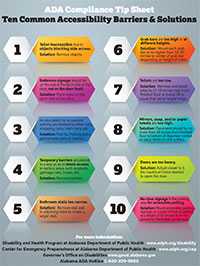Assessment
Communities that are well prepared to protect against, respond to, and recover from disasters have disability inclusive emergency plans, accessible shelters, and policies to address the challenges that people with disabilities are most likely to experience during emergencies and disasters. State Disability and Health Programs have worked with their community partners to make sure all these elements are in place.
Resources to Assess Shelters
Shelters need to be accessible for people with disabilities. States have created materials that shelter managers can use to assess and improve their capacity to provide appropriate care and timely access to people with disabilities.
Alabama

ADA Compliance Tip Sheet: This resource helps shelter managers assess common accessibility barriers and find solutions.
Montana
Montana Shelter 2020 Initiative: This five-year statewide project guides local emergency planners and their partners through series of assessments and planning activities to build the capacity of selected shelters to serve the whole community. Through Shelter 2020, Montana Disability and Health Program Accessibility Ambassadors collaborate with local emergency managers to assess each shelter’s accessibility and identify any needs for improvement. For this purpose, the Montana Disability and Health Program has updated the Department of Justice’s ADA Checklist for Emergency Shelters to include 2010 standards. This version with a training presentation is available on the program’s website.
South Carolina
Assistive Technology in Emergency Shelters: This flyer teaches shelter managers about basic assistive technology that people with disabilities may need to increase, maintain or improve their functional capabilities.
- Page last reviewed: September 26, 2016
- Page last updated: September 26, 2016
- Content source:




 ShareCompartir
ShareCompartir